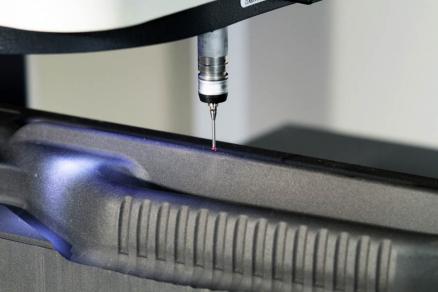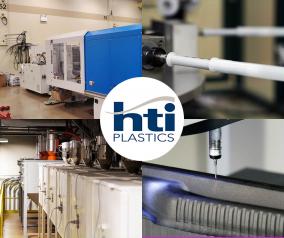This week “From the Heartland” will focus on the topic of “Technology.” The Midwest is home to 60% of all U.S manufacturing and 150 Fortune 500 companies. In our industry, technology, engineering, automation, and innovation are one of our biggest focuses.
“The use of robots, conveyor systems, or safety systems in injection molding processes is common practice and helps to run the production more efficiently and smoothly. Automated processes are more reliable and can guarantee more consistent part quality.” (Plastics Technology, n.d)
At HTI, we invest in the latest technology to help our production floor streamline processes and improve workflows. We update and add new equipment that will allow us to manufacture injection molded parts with higher-quality, better precision, and efficient running time.

Injection molding Machines
At HTI Plastics, we have a state- of- the- art facility with about 30 injection molding presses, ranging from 40 Tons to 1800 Tons. We keep our equipment in top working condition through our PM program, and we continuously evaluate if they need repairs, or if we need to invest in new machines to add capacity.
In the last year, we have test and purchased new Krauss Maffei Injection molding machines, we bought a new Haas CNC machine, we installed a new crane, and more. We also attend tradeshows like NPE, Pack Expo, and others to learn about new technology available in the market.

Design for Manufacturability (DfM)
What is DfM?
Design for Manufacturability is the process of designing parts, components, or products for ease of manufacturing with an end goal of making a better product at a lower cost. DfM simplifies, optimizes, and refines the product design. A company should not have to compromise on whether to have lower-cost products over better quality or vice versa. With DfM, our engineers can design a product with both components in mind.
Principles of DfM
Manufacturing Process: Choosing the right method to create a product. The engineer will decide whether injection molding is the proper process for your product, based on the project’s quantities and longevity.
Design: A design must conform to Good Manufacturing Processes (GMPs). The design needs to make sure there’s an appropriate and constant wall thickness, an appropriate draft, specification of tolerances, and more.
Material Selection: Selecting the right material for your product is very important, and with our Engineers’ experience, they will be able to design with the right one. They will look at the properties’ list when selecting the material, like mechanical properties, optical properties, thermal properties, color, electrical properties, and flammability.
Environment: It is important to review the applications of the products, determine the environment it must withstand, and consider designing the part so it can function properly under its normal operating conditions.
Compliance/Testing: Our engineers will ensure the design will comply with safety and quality standards, ISO: 9001 regulatory standards.
Design for Manufacturability at HTI Plastics
When our engineers are designing a product from scratch, they keep DfM at the forefront of the designing process. DfM requires a different type of creativity from engineers because they need to think of ways to simplify the manufacturing process.
When our engineers are reviewing designs supplied to them by the customer, they review the design to make sure the part can be molded. They also look for potential areas of concern, both for the manufacturing and the end-user/customer.
“We look for areas that may be difficult to control dimensionally, create functionality problems, and/or areas that could have cosmetic flaws,” said Jamee Thieman, Senior Engineer at HTI Plastics. “We also may find areas that could be modified to produce the same part but keep mold and/or part costs down by making the part easier to mold. We then communicate our concerns or ideas back to the customer so changes can be made before the project kicks off”.
There are exponential cost benefits of correcting potential problems in the design stage instead of trying to correct something after the mold(s) have been built. The more information is available up-front concerning the application of the part and any compliances needed (part function, environment, mechanical requirements, regulatory requirements, etc.), the more feedback/input our engineers can provide.
At HTI, we pride ourselves in having transparent and on-time communication with our customers. HTI’s engineers will have open communication with our customer’s engineers (if they have them), so we can work together to provide our customers with their desired product while manufacturing it as efficiently as possible.

Why is DfM Important?
DfM is important because it allows engineers to address any problem early in the design phase. DfM allows for changes to be less disruptive and less expensive. “Through a set of DfM practices, specific guidelines help define various tolerances and other data to ensure each phase operates as desired before moving on to the next step in the design process” (David, G, 2019).
Engineering Tools
Our HTI Plastics engineers use Finite Element Analysis (Solidworks Simulation), Plastic Flow Simulation (Solidworks Plastics), and over 50+ years of combined experience in the plastics industry. We are continually evaluating technology to determine whether it can help us provide more value-added services for customers.
Engineering Training
HTI Plastics does not stop at investing in new machines and software; our most significant assets are our employees, and that is why we also see the importance of investing in them. Our engineers receive continuous training courses, including RJG’s Decoupled Molding, RJG’s Master Molder, Beaumont AIM Institute’s PTE, and other industry seminars and courses.
If you have any questions about our services and capabilities, please visit us at www.htiplastic.com or call us at 1- 800-824-0607, and one of our customer service representatives will be happy to help.
References
David, G (2019). Why Design for Manufacturability (DfM) is critical for Mechanical Assemblies. Retrieved from: https://www.mcl.bz/blog/why-design-for-manufacturability-dfm-is-critical-for-mechanical-assemblies
East West Manufacturing (2020). What is Design for Manufacturing or DFM?. Retrieved from: https://news.ewmfg.com/blog/manufacturing/dfm-design-for-manufacturing
Plastic Technology (n.d.). Plastic Injection Molding: Automation. Retrieved from: https://www.ptonline.com/knowledgecenter/plastic-injection-molding/automation
The Hustle (2018). Life in the Silicon Prairie: Tech’s great migration to the Midwest. Retrieved from: https://thehustle.co/life-in-the-silicon-prairie-techs-great-migration-to-the-midwest/

